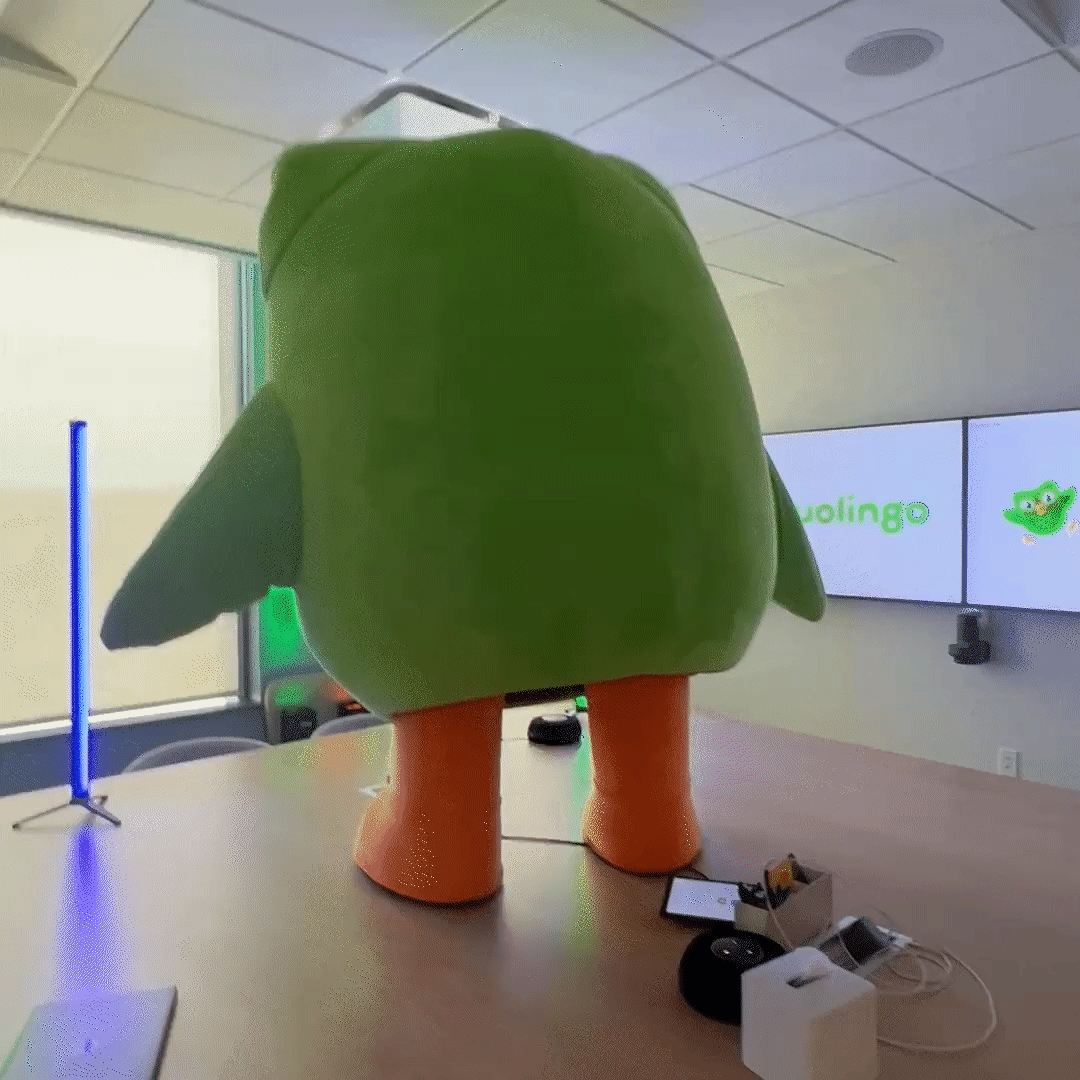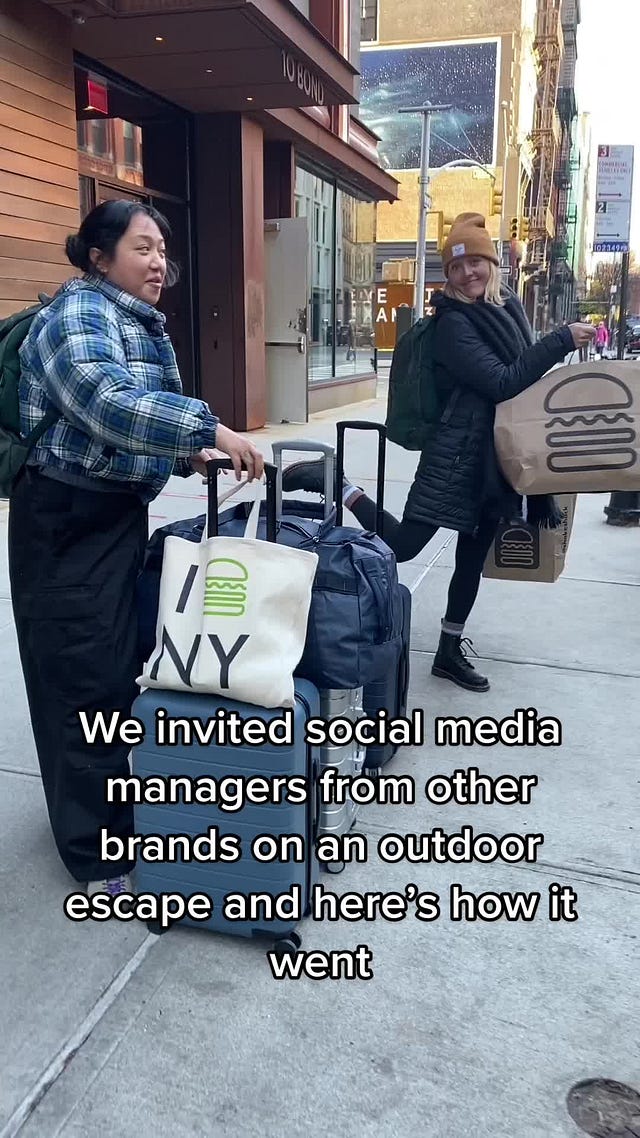Is the twerking owl anti-vax? And other serious questions.
You don't have to be unhinged to post brand content on social, but it helps
Hello friends,
Lately, I’ve been trying to grow my personal brand. Now, I’m not 100% sure what a personal brand is, but everyone says you should have one and that ‘growing’ it is very important.
I’ve read a lot about how you grow personal brands, and apparently, it amounts to ‘posting every day on LinkedIn’. So for the last 30 days, I’ve been doing precisely that.
It's pretty easy, really. All you have to do is copy-paste the day before and change the number. Why are we not all already doing this? Who doesn't want a personal brand?
How are the posts performing? Pretty well, thanks for asking.
The initial spike in impressions on Day 2 has flatlined since then. But brand-building is all about consistency. So I'm sure we'll see things pick up again around Day 500.
I’ve also written a few blogs you might want to check out:
And, as always, if you’re new to The Social Roast, gimme a subscribe ffs:
Ok, here’s the goods.
Social Media Managers as the ‘main character of brands’
Inspired by this TikTok from Away (they make suitcases):
 Tiktok failed to load.
Tiktok failed to load.Enable 3rd party cookies or use another browser
We’re increasingly seeing SMMs becoming almost the face of the company they’re creating content for. Duo is the most obvious case since it’s already a literal mascot. But think about something like NPR’s Planet Money TikTok, where the ‘Planet Money Guy’ is an inseparable part of the content.
The way this emerges is interesting. It begins from a place of necessity; social teams usually don’t have large budgets - so if you want something with a face in it, it’s probably going to have to be your face. But do that for long enough, and - uh-oh - your face is now part of the brand.
Don’t get me wrong, that’s not necessarily a bad thing. It works for Planet Money and has worked in countless cases before. Remember Scott from HQ Trivia? You probably remember him more than you remember HQ Trivia (RIP).
But if this is going to become a thing, it's important to set boundaries. Nowhere in my job contract does it say anything about modelling or presenting work, and we should be wary of any job' scope creep'. And if your face ends up on an ad that drives 50,000 conversions, should you see a cut? You'd undoubtedly pay an influencer for that kind of performance.
So the jury is semi-out on this one. But if you’re going to do it, do it deliberately - and with the enthusiastic consent of everyone involved.
Leaning into the bits of your brand you want to avoid talking about.
Inspired by this Vim(p)to campaign:
(The follow-up was a miss for me, though).
If brand = what your customers think about when they think about you, then tapping into these kinds of things is very smart. Even if that's not something your traditional brand guidelines want you to say about yourself.
You’re probably pronouncing IKEA, Nike, Hyundai, and Adidas wrong every day. But the smart move from the brands is to accept that and even play with it. Otherwise, the brand you're building internally and the brand that lives in the world are two different things. And disconnect from reality is brand death.
This extends beyond the basic brand kit of name, font, and colours. I’m sure Sun Maid’s brand guardians would love their socials to focus on the health benefits of eating raisins, but that’s not what people talk about when they talk about raisins, is it?
Employer branding and tech layoffs
Things are very scary in the tech world atm. We’ve seen layoffs at all the industry giants for reasons I don’t quite understand. Is Google seriously worried that its financial future depends on whether or not it can afford to keep some of its staff? It’s rough.
And it creates a bit of cognitive dissonance between how brands like to portray the experience of working for them and the reality of it. There’s an increasing trend of ‘a day in the life’ videos showcasing all the benefits and perks involved in a job. A job that can then suddenly be cut off with zero notice.
And there’s also a bit of, I think, undeserved backlash to this content. Here’s an example:
The criticism goes along the lines of ‘well, of course, they deserve to get laid off; it looks like they do zero work and just eat big meals all day’. This is obviously untrue, though widely believed (it’s seemingly a big part of how Musk perceived Twitter employees). And yes, working for a tech company is cushy in many ways - but it’s also challenging.
As a side note, I think ‘TikToking on the job’ is probably a good thing and also not something you’ll be able to stop. Last week, British Airways tried to clamp down on their employees using social at work. And they go got so much backlash they had to publicly apologise. So you’re not going to stop it, and you shouldn’t try. Instead, have internal guidelines that empower people to do it safely.
We do a lot of employer branding content at Monzo, and I’m always wary of the balance between portraying ‘life at Monzo’ as fun/desirable, and serious. Nobody wants to see their bank doing the Harlem Shake if they’re waiting for someone to pick up the phone on an urgent issue.
So as always: when in doubt, put a dog in it.
Inserting yourself into broader culture.
It’s a question as old as time: how do you talk about things outside your brand’s immediate remit?
Say you’re a shoe company. Your immediate remit is shoes, which is still quite a lot. Soles, laces, shoe materials, shoe types, famous shoes, etc. The wider remit is anything shoe-adjacent: walking, travelling, occasions you might wear shoes, accessorising, etc. But how far does this license extend? Can a shoe company talk about politics?
It's a central challenge, and how brands answer it is interesting. At Monzo, we’re a bank. Our immediate remit is money, and our broader remit is anything money-adjacent. You use money for basically everything, so that’s easy. But can we talk about culture? The news? Religion?!
Innocent live-tweet Bake Off. PrettyLittleThing tweet about Cathedral City Cheese bites. Duolingo talk about London Fashion Week.
So yes, you absolutely can reach beyond your remit into culture. But it still has to tie back to the brand, right? (Brand, not product). Innocent are all about fun and everyday British conversations - so the weather and Bake Off make sense. Duolingo have a strong green brand, so the fashion week makes sense. I don’t know what the PLT/Cheese connection is, but I’m sure they know what they’re doing.
What are the risks? Well….
Duolingo split the internet once again.
Consider this tweet:
An exegesis: in this tweet, Duolingo reference an anti-vax trope of people experiencing seizures as a side-effect of the Covid vaccine. An owl twerks. Jesus wept.
Obviously, this is a troll. Duolingo are not coming out as anti-vax - in fact, it’s a way of being pro-vax (without saying that). And so everyone thought it was very funny. Right?
Well, sort of. Duolingo’s core audience, Gen Z / millennials who get the joke clicked with it. Anti-vaxxers who realised they were being made fun of freaked out. And then there was a third group: boring killjoy marketers saying this is very dangerous.
I recently predicted that social media in 2023 is only going to become more and more unhinged:

But is that a good thing? Is it good for Duolingo to repeat anti-vax rhetoric, even if it’s a joke against anti-vaxxers? Isn’t it such a politically charged issue that any brand benefit is overwhelmed by the brand risk? DOES ANYONE CARE EXCEPT ME?
Well, Jon agrees, and I like Jon’s opinions (read the whole thread):

I’d love to hear comments from y’all on this. Is it good or bad for a brand to pretend to be anti-vax for engagement? Does anyone care except marketing nerds? Let me know.
That’s it for now. Thanks for reading!
Here’s an all-time great reply from Tesco:















